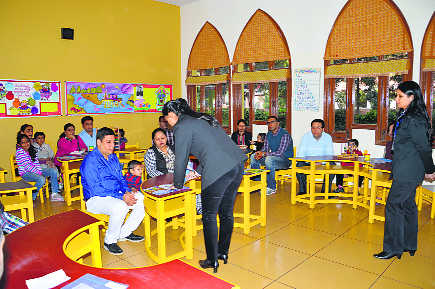
Both parents and teachers should focus on the child’s wellbeing
Jayanti Roy
For every parent, parent-teacher meetings (PTM)s are important dates on the calendar as most of the schools conduct three to four such interactions in a year where parents and teachers meet face to face to discuss the students’ performance in academics and in case of any problem, to find a solution by mutual cooperation. Ideally, a PTM should focus on the child’s wellbeing addressed by the two parties which are in intimate contact with her/him.
However, it is often seen that the objective of a PTM is lost due to one or the other reason and it becomes more of a ritual. Many of the parents assume that PTM is an opportunity where they should report about their child’s behaviour at home. They begin with a litany of complaints against the child ranging from his food habits to TV watching, playing for long hours and not studying enough. As if embarrassing the child thoroughly would bring improvement. Parents often tell the teachers to feel free to give physical punishments to the child ‘to bring him to the right path’.
On the other side of the spectrum are parents who refuse to listen to any kind of constructive criticism of their child by the teacher and lose on the opportunity to peep through the window to their child’s soul that the teacher is willing to open for them.
Teachers, too, are often arrogant, chauvinistic and condescending making the parents acutely aware of the shortcomings of their child up to the point of making them feel like culprits. Many schools insist that teachers only converse in English with the parents. Jatinder Pal (name changed) who is working as a peon in an office in Jalandhar says that he always feels belittled and uncomfortable in such meetings. “While the teacher keeps on telling that my child is weak in studies but never tells me how I can deal with this problem. I have admitted my child in a good school now the teachers should pay attention to his studies but I cannot communicate with the teacher freely. I have almost stopped going to such meetings asking my wife to attend these instead,” he says.
Naveen Trehan, an advocate based in Patiala, actively participates in these meetings contrary to the general trend of mothers being more involved in the child’s educational progress. He brings in another aspect of high teacher-student ratio which mars the very objective of a PTM. In a class of 50 students it is not possible for a teacher to get a correct evaluation of each student. As a result the teacher has nothing much to convey to the parents as feedback about the conduct of the child except his academic grades. The parents’ inputs about the child are also of not much use to the teacher. A PTM becomes a mere formality in such cases.
According to Anu Batish, a school teacher in Patiala, a PTM is a good opportunity for the teachers to understand the background of the student and to go deep into the cause of his/her performance level or conduct. She is dealing with Classes XI and XII. She says that parents of adolescent children think that there is no need for interaction with the teacher. On the contrary, it is even more important for the parents to be aware of their child’s behavioural changes and to find if the child is well adjusted. She emphasizes that many a times the parents may miss out on significant changes in the child’s personality which are easier for a teacher to notice.
Aparna Ghosh, a school teacher from Shimla and mother of a nine-year-old girl Aadya who is attending a prestigious school in Shimla, says that as a parent one must be alert and aware towards the academic inputs that the child is receiving as well as his/her socialisation process in the classroom as well as outside the classroom within the school campus. It helps to keep written notes on issues one would like to discuss in the PTM. Parents should have a friendly attitude towards the teacher and show the trust they have in the teacher for the betterment of the child. Parents should ask appropriate questions and not indulge in meaningless conversation. They can bring up any problem or issues that the child is facing but this must be done without accusations. The bottom-line is that though parents and teachers sit across the table in a PTM but both are on the same side with a single goal to help the child achieve her full potential.



























